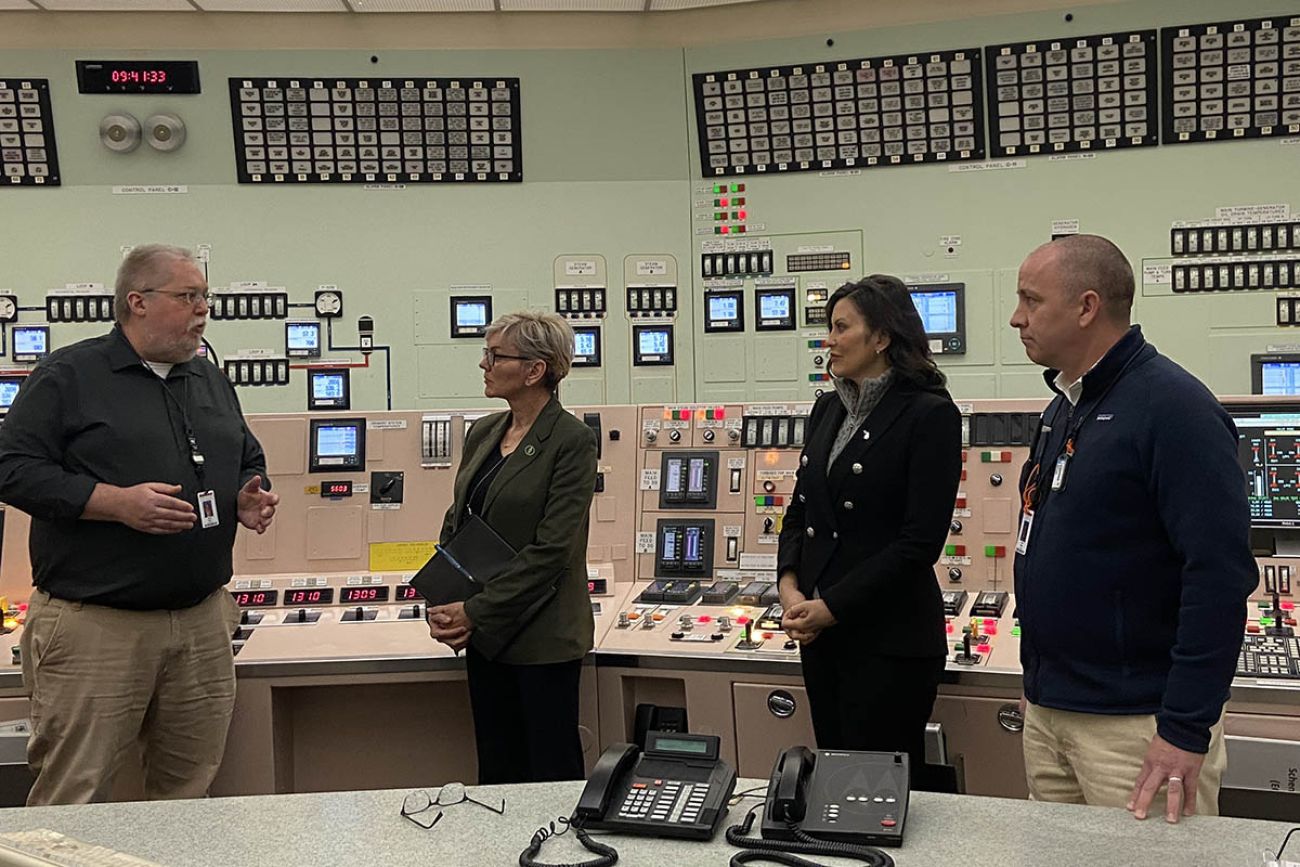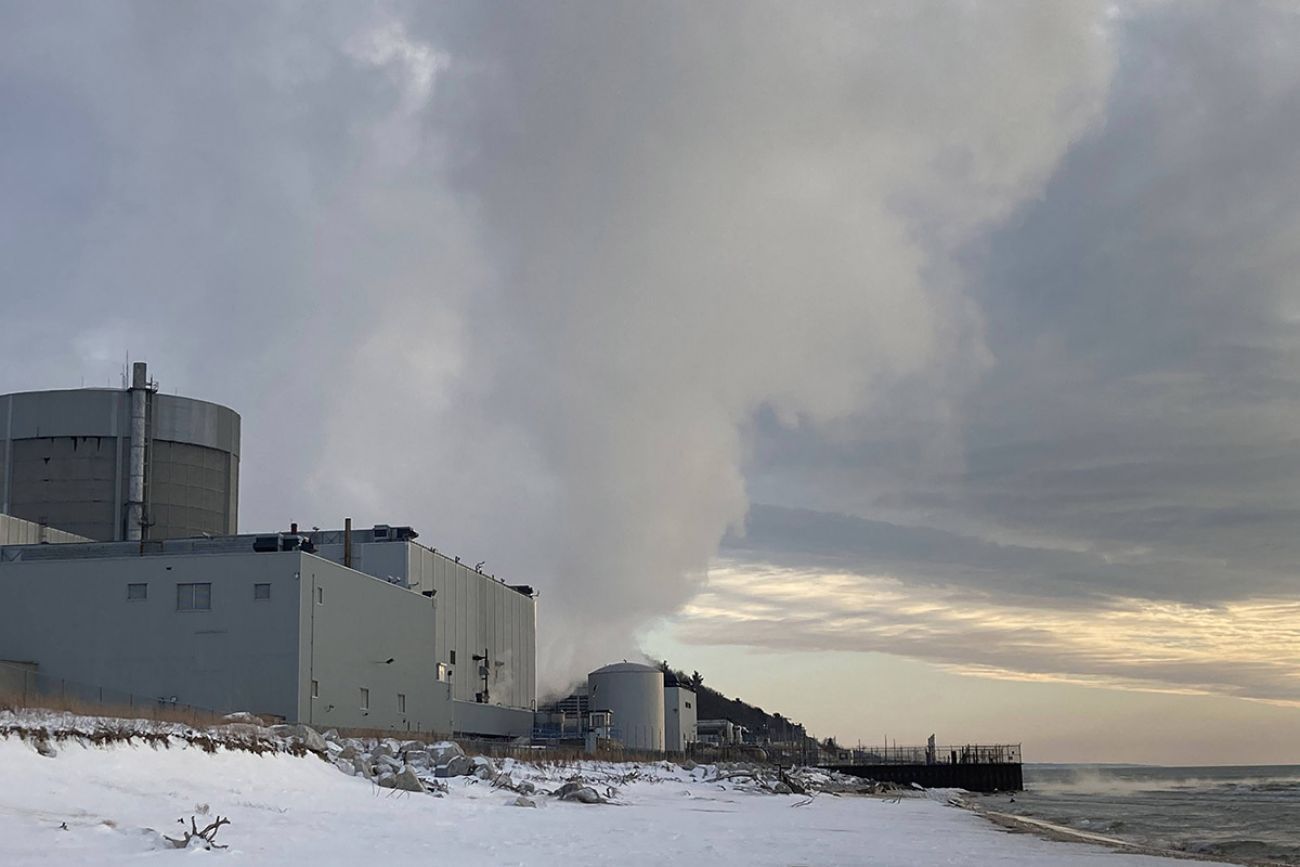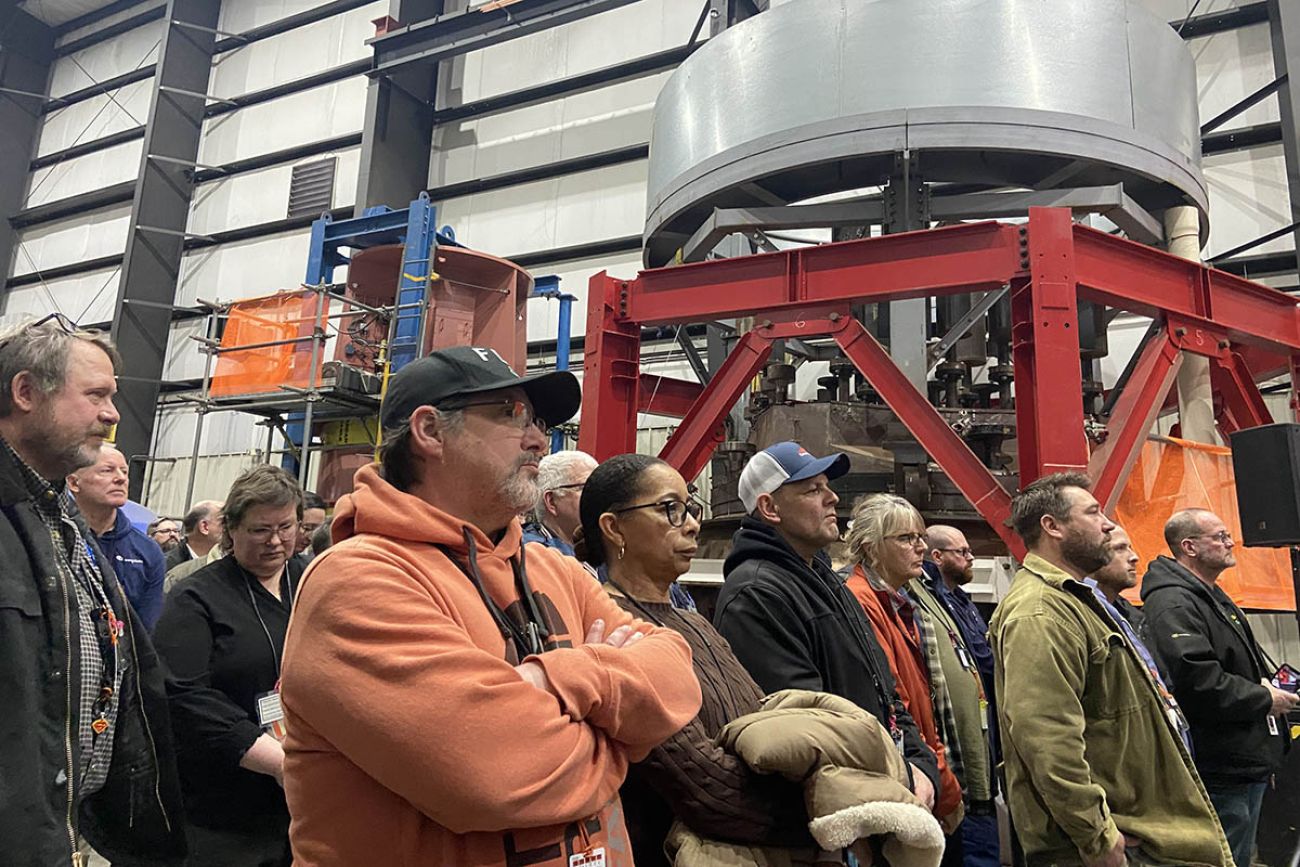Nuclear power plant in Michigan awarded $1.5B for nation's first restart

- The effort to restart the shuttered Palisades nuclear plant just won a $1.5 billion federal loan
- The money comes in addition to $150 million in state dollars for the effort, with more state and federal subsidies likely
- Supporters cheered the plan to bring jobs and nuclear energy back to southwest Michigan, while opponents decried safety risks and called for other spending priorities
March 28: Nuclear plant restart plan stirs hope, reunions in small Michigan town
COVERT TOWNSHIP —The federal government will provide a $1.5 billion loan to restart the shuttered Palisades nuclear power plant, Energy Secretary and former Michigan Gov. Jennifer Granholm announced Wednesday.
Joined by current Michigan Gov. Gretchen Whitmer and an array of state and local officials and Palisades employees, Granholm made the announcement before a packed crowd inside a dry fuel storage hangar at the nuclear facility on Michigan’s southwest coast.
Along with hundreds of supporters, a handful of protestors gathered near the back of the room, but were swiftly booted.
Related:
- Report: Feds will give $1.5 billion to restart Palisades nuclear plant
- Michigan company agrees to buy nuclear power from shuttered Palisades plant
- Fresh off Palisades closure, Michigan will study state’s nuclear prospects
Advocates of the power plant called it an historic day — a major stride toward repowering a facility that has sat idle since May 2022, when its previous owner completed a long-planned shutdown.
The plant had struggled to remain cost-competitive against cheaper wind, solar and natural gas. But the financial math soon changed.
Just weeks before the closure, in April 2022, the Biden administration announced a $6 billion program to bail out struggling nuclear plants amid fears that allowing them to shut down would hinder the nation’s energy transition. The funds announced Wednesday won't come from that pool, but Granholm said Wednesday that Holtec may be eligible for additional federal dollars.
“Even as we deploy more solar and wind and batteries, we’re going to need more, not less, nuclear power,” Granholm said.
The mothballed 800-megawatt plant is capable of powering more than 800,000 homes. Its owner, Holtec International, has also announced plans to build two small modular reactors at the Palisades site, which would add another 600 megawatts of energy.
Whitmer, who had campaigned aggressively to restart the plant, called Wednesday’s announcement an economic win for southwest Michigan, where a fully operational Palisades had a regional economic impact in the hundreds of millions.

“It was a long, windy road to get here, but I’m so happy to be here,” Whitmer said.
If successful, Palisades would be the first restarted nuclear power plant in American history. Holtec still needs several clearances from the Nuclear Regulatory Commission before it can begin repowering. It must also re-hire hundreds of staff and conduct on-site work to make the facility operational.
Whitmer batted away questions about what happens if those efforts don’t succeed.
“It’s going to come back online,” she said.
Wednesday’s announcement of a conditional loan of up to $1.52 billion from the U.S. Department of Energy brings total subsidies allocated so far for Palisades’ reopening to at least $1.67 billion, with more likely on the way.
In addition to the federal loan, Michigan has allocated $150 million and Whitmer’s proposed budget would double that amount. Holtec could also be eligible for federal nuclear tax incentives, Granholm said. And Wolverine Rural Electric Cooperative, a Cadillac-based nonprofit that plans to buy power from Palisades, is seeking federal subsidies to offset nuclear’s high cost.
Beyond that, Holtec is seeking a $7.4 billion federal loan to build small nuclear reactors on the Palisades site and possibly other properties.
Opponents raise concerns
Nuclear critics argue the billions could be better spent on other priorities, such as installing more wind and solar generation.
Kevin Kamps, a radioactive-waste specialist with Beyond Nuclear, also argued the 53-year-old plant is too old and unsafe to withstand more years in operation. His group has long expressed concerns about nuclear meltdown risks at the plant.
Kamps said the unprecedented attempt to restart a shuttered plant raises more fears about how Holtec will address a lack of maintenance and inspections while the plant was closed.
“It’s radioactive Russian roulette on the Lake Michigan shoreline,” said Kamps. “The safety risks are hard to overstate.”
Touring a simulated control room at Palisades before the announcement, Granholm and Holtec officials sought to dispel any safety concerns.

“It’s my understanding that this plant, in particular, has an excellent safety record,” Granholm said.
During her remarks Wednesday, Granholm said the U.S. needs to triple its nuclear energy supply in order to ditch greenhouse gas-emitting power sources by midcentury.
Last week, a bipartisan group of state Representatives introduced legislation to encourage nuclear energy generation, saying they hope to make Michigan a national leader.
House Bills 5606-5609 would establish siting requirements for small modular reactors, a new form of nuclear reactor that backers tout as safer and cheaper. The legislation would also create a grant program for colleges and universities to train students for the nuclear and hydrogen industries, financial incentives for graduates who agree to work in a nuclear or hydrogen plant, and tax credits for small modular reactor research and development.
In a statement, Rep. Graham Filler, R-St. Johns, said the package “is designed to encourage investment in safe, clean and reliable nuclear energy technology that is essential for our energy needs.”
Speaking at Wednesday’s event, Rep. Joey Andrews, D-St. Joseph, called the Palisades repowering effort good news for Southwest Michigan after years of economic struggle.
The plant’s closure, he said, “felt like one more hit that our region was going to take.” News of a likely reopening, he said, has prompted waves of phone calls to his office from manufacturers, data center developers and other businesses looking to site their operations near a reliable power supply.
If Holtec’s plans come together, the company anticipates reopening Palisades in late 2025. It plans to then set its sights on building the two small modular reactors by 2030.
Kelly Trice, Holtec’s president of nuclear generation and decommissioning, said repowering the plant would bring “jobs, economic growth, carbon-free baseload energy” back to the region.
But he acknowledged that before that can happen, there are “a couple of details to work out first.”
Michigan Environment Watch
Michigan Environment Watch examines how public policy, industry, and other factors interact with the state’s trove of natural resources.
- See full coverage
- Subscribe
- Share tips and questions with Bridge environment reporter Kelly House
Michigan Environment Watch is made possible by generous financial support from:
Our generous Environment Watch underwriters encourage Bridge Michigan readers to also support civic journalism by becoming Bridge members. Please consider joining today.
See what new members are saying about why they donated to Bridge Michigan:
- “In order for this information to be accurate and unbiased it must be underwritten by its readers, not by special interests.” - Larry S.
- “Not many other media sources report on the topics Bridge does.” - Susan B.
- “Your journalism is outstanding and rare these days.” - Mark S.
If you want to ensure the future of nonpartisan, nonprofit Michigan journalism, please become a member today. You, too, will be asked why you donated and maybe we'll feature your quote next time!






